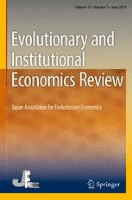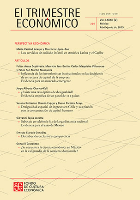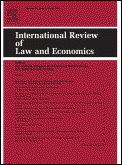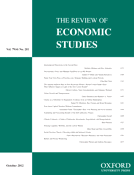
Review of Austrian Economics
Scope & Guideline
Advancing the discourse in Austrian economic thought.
Introduction
Aims and Scopes
- Austrian Economic Theory:
The journal primarily focuses on the Austrian school of economics, exploring its foundational theories, methodologies, and applications in various economic contexts. - Interdisciplinary Perspectives:
It encourages contributions that intersect with other disciplines, including political science, sociology, and philosophy, thereby enriching the discourse surrounding economic ideas. - Historical Analysis:
The Review places significant emphasis on historical perspectives, examining the evolution of economic thought and its implications for modern economic practices. - Policy Implications:
Articles often discuss the practical implications of Austrian economics for public policy, governance, and economic systems, highlighting the relevance of theoretical insights to real-world challenges. - Critique of Mainstream Economics:
The journal critiques and contrasts Austrian economic principles with mainstream economic theories, particularly regarding topics like central planning, regulation, and the role of government in the economy.
Trending and Emerging
- Behavioral Economics:
An increasing number of papers are integrating insights from behavioral economics, exploring how psychological factors influence economic decision-making, which complements traditional Austrian views on subjective value. - Digital Economy and Technology:
The rise of digital platforms and their economic implications is a hot topic, with papers addressing how Austrian economics can inform the understanding of new market dynamics and innovation. - Sustainability and Development:
There is a notable trend towards examining sustainable development through the lens of Austrian economics, reflecting a growing concern for ecological issues and equitable resource allocation. - Cognitive Economics:
Emerging discussions on cognitive economics highlight how cognitive processes affect market behavior and decision-making, representing a synthesis of Austrian and modern economic thought. - Global Economic Challenges:
The journal increasingly addresses global challenges, such as those posed by pandemics and geopolitical tensions, applying Austrian insights to analyze and propose solutions for contemporary issues.
Declining or Waning
- Classical Liberalism:
Although still relevant, discussions explicitly centered on classical liberalism seem to have decreased, with fewer papers directly addressing its principles in the context of modern economic issues. - Traditional Business Cycle Theory:
The exploration of traditional Austrian business cycle theory appears to be waning, with a noticeable shift towards incorporating contemporary insights and methodologies, such as Schumpeterian elements. - Environmental Economics:
While environmental concerns remain significant, the specific intersection of Austrian economics with environmental issues has seen less focus, possibly overshadowed by more pressing economic discussions. - Historical Figures' Contributions:
The frequency of papers dedicated to historical figures within the Austrian school, such as Menger and Hayek, has diminished, suggesting a move towards applying Austrian principles to current economic phenomena rather than historical analysis. - Microfoundations of Economics:
There is a trend of less emphasis on microfoundational debates within Austrian economics, as the journal seems to prioritize broader theoretical applications and interdisciplinary connections.
Similar Journals

Asian Journal of Applied Economics
Advancing Economic Insights Across AsiaAsian Journal of Applied Economics is a prestigious academic journal published by Kasetsart University, Faculty of Economics, dedicated to advancing the field of applied economics within the Asian context. With a strong commitment to open access, this journal ensures that vital research is accessible to a diverse audience, fostering knowledge exchange among researchers, professionals, and students. The journal covers a broad spectrum of topics related to applied economic theories, practical applications, and policy implications pertinent to Asia, making it an essential resource for those involved in economic research and analysis. Although specific metrics such as the impact factor and H-index are currently unavailable, the journal's reputation within the field continues to grow, underpinned by a robust editorial board and thorough peer-review processes. Researchers are encouraged to submit their work to contribute to the evolving discourse in applied economics, thereby influencing both academic and practical efforts in this crucial area of study.

Evolutionary and Institutional Economics Review
Decoding the Evolution of Economic InstitutionsThe Evolutionary and Institutional Economics Review, published by SPRINGER HEIDELBERG, serves as a pivotal platform for disseminating cutting-edge research in the dynamic fields of evolutionary and institutional economics. With its ISSN 1349-4961 and E-ISSN 2188-2096, this journal emphasizes interdisciplinary approaches that explore how economic institutions evolve and impact economic performance and social welfare. Although currently not open access, it provides invaluable insights for researchers, professionals, and students keen on understanding the intricate relationships between economic systems and institutional frameworks. The journal aims to foster academic discourse that bridges theoretical perspectives and practical implications, enhancing the scholarly conversation within the economic community. Its headquarters in Heidelberg, Germany, positions it at the heart of European economic research, making it an essential resource for anyone interested in the evolution of economic thought.

Review of Economic Analysis
Connecting Scholars to Transform Economic KnowledgeReview of Economic Analysis is a distinguished open-access journal published by DIGITAL INITIATIVES, UNIVERSITY OF WATERLOO, that has been committed to disseminating high-quality economic research since its inception in 2009. Renowned for its rigorous peer-review process, the journal provides a platform for innovative findings in the field of Economics and Econometrics. With an impact factor that underlines its relevance in academic circles, the journal continues to uphold scholarly excellence, currently classified in the Q3 category (2023) within the Economics and Econometrics domains, ranking #549 out of 716 in Scopus. The open-access model ensures that critical research is accessible globally, fostering collaboration and knowledge-sharing among researchers, professionals, and students. Interested contributors and readers can connect with the journal's vibrant academic community based in Waterloo, Canada, and explore a diverse array of articles that push the boundaries of economic analysis and understanding.

TRIMESTRE ECONOMICO
Connecting Scholars to the Pulse of Economic Science.TRIMESTRE ECONOMICO, published by FONDO CULTURA ECONOMICA, is a prominent open access journal in the field of Economics and Econometrics based in Mexico. Since its inception in 1979, this journal has served as a critical platform for disseminating scholarly research and theoretical advancements within economic sciences, addressing both contemporary issues and historical perspectives. With an impact factor that ranks it within the Q3 category among 716 journals in its field, TRIMESTRE ECONOMICO continues to contribute significantly to the academic community, providing readers with insights into economic modeling, policy analysis, and empirical research. The journal has embraced open access since 2011, fostering a broad reach and encouraging innovation and collaboration among researchers, professionals, and students. It is essential reading for those seeking to deepen their understanding of economic trends and theories, making valuable contributions to both local and global discussions.

CAMBRIDGE JOURNAL OF ECONOMICS
Fostering Knowledge in Economics and EconometricsCambridge Journal of Economics, published by Oxford University Press, is a premier academic journal in the field of economic theory, policy, and applications, catering to researchers, professionals, and students alike. With a rich history dating back to 1977, this journal has established itself as a notable contributor to critical discourse in the arena of Economics and Econometrics. With an impressive Scopus ranking of #210 out of 716 in its category, placing it in the 70th percentile, the journal maintains a solid Q2 classification, reflecting its significant impact and contribution to the field. Although it operates on a subscription basis, the Cambridge Journal of Economics is accessible through a range of academic databases and libraries, ensuring that its high-quality research reaches a wide audience. The journal aims to advance the understanding and application of economic principles, making it an essential resource for anyone looking to deepen their knowledge or stay updated with the latest research trends in economics.

INTERNATIONAL REVIEW OF LAW AND ECONOMICS
Unraveling Complexities in Law and Economic Theory.The INTERNATIONAL REVIEW OF LAW AND ECONOMICS, published by Elsevier Science Inc, stands as a premier academic journal dedicated to the interdisciplinary exploration of law and economics since its inception in 1981. With an impressive convergence of insightful research and theoretical advancement, the journal encapsulates critical findings that bridge legal studies and economic principles. Ranked in the Q2 category for Economics and Econometrics and Finance, alongside a notable Q1 ranking in Law, it highlights its significant influence and high-quality scholarship within the academic community. The journal is indexed in Scopus, achieving commendable rankings which reflect its importance, ranking #188 out of 1025 in Law and #343 out of 716 in Economics and Econometrics. With no Open Access option specified, readers are encouraged to engage with the content through institutional access or subscription. This journal is essential reading for researchers, practitioners, and scholars looking to deepen their understanding of how legal frameworks intersect with economic theories, making it a vital resource in both fields.

History of Economic Thought and Policy
Advancing Understanding of Economic Thought and Its ImpactHistory of Economic Thought and Policy is a vital journal published by FRANCO ANGELI, dedicated to exploring the intersections of economic theory, historical context, and public policy. With ISSN 2240-9971 and E-ISSN 2280-188X, this journal serves as an essential platform for scholars interested in the evolution of economic ideas and their implications for contemporary policy-making. Operating from Italy, it has established a comprehensive framework for interdisciplinary research in the fields of Economics and Econometrics, History, and Public Administration, although it currently holds a Q4 ranking in these categories according to 2023 metrics. The journal already encompasses multiple converging years from 2018 to 2024, underscoring its commitment to timely contributions to economic discourse. It aims to provide open access to its content, fostering a collaborative environment for researchers, professionals, and students keen on enhancing their understanding of economic thought throughout history. Despite its current challenges in Scopus rankings, with notable positions in arts, humanities, and social sciences, History of Economic Thought and Policy remains a promising outlet for significant and critical discussions surrounding the historical pathways that shape today’s economic policies.

Economics and Business Review
Elevating insights in business and economic research.Economics and Business Review is a prominent open-access journal dedicated to advancing knowledge in the fields of business, economics, and finance. Published by SCIENDO, this journal aims to provide a platform for innovative research and critical discourse, fostering collaboration among scholars, practitioners, and students alike. With its ISSN 2392-1641 and E-ISSN 2450-0097, Economics and Business Review has established itself within the academic community since becoming open access in 2018. Based in Poland, the journal covers a wide range of topics within its converged years (2019-2024) and has achieved a Q3 category ranking in various disciplines, including Business and International Management, Economics and Econometrics, and Finance as of 2023. These accolades underscore its growing influence, as evidenced by its Scopus rankings, which place it among the notable contributors in these domains. The journal's commitment to accessibility and scholarly rigor ensures it is a vital resource for researchers and professionals striving to remain at the forefront of economic and business trends.

Econ Journal Watch
Exploring Contemporary Economic Theories and Issues.Econ Journal Watch is an esteemed scholarly publication dedicated to advancing the field of economics through critical analysis and discourse. Established by the Institute for Spontaneous Order Economics, this journal aims to provide a platform for researchers, professionals, and students to examine and reflect on contemporary economic issues and theories. With an ISSN of 1933-527X and an E-ISSN of 1933-527X, it has positioned itself within the competitive realm of economics and econometrics. As part of the Q4 category in the 2023 rankings for Economics and Econometrics, the journal is indexed on Scopus, ranking at #569 out of 716 institutions, placing it within the 20th percentile. Although it currently maintains a non-Open Access model, it offers valuable insights and rigorous analysis from 2008 to 2024, contributing significantly to the discourse in economics. The journal’s commitment to fostering a deeper understanding of economic principles makes it an essential resource for anyone engaged in the economic field.

REVIEW OF ECONOMIC STUDIES
Elevating the Standards of Economic Research and ScholarshipREVIEW OF ECONOMIC STUDIES, published by OXFORD UNIVERSITY PRESS, stands as a premier academic journal in the field of Economics and Econometrics. Established in 1933, it has maintained a strong tradition of scholarly excellence, evidenced by its prestigious Q1 category ranking and its position in the top 93rd percentile among its peers, with a remarkable Scopus rank of #49 out of 716 related journals. This reputable journal aims to publish high-quality research that advances theoretical understanding and empirical knowledge in economics, fostering a dynamic dialogue among researchers, professionals, and students alike. Despite not being an open access journal, the REVIEW OF ECONOMIC STUDIES provides invaluable insights and impactful findings that shape the discourse in the economics community, making it a vital resource for those engaging in rigorous economic analysis and policy-making.